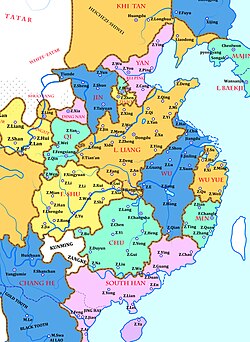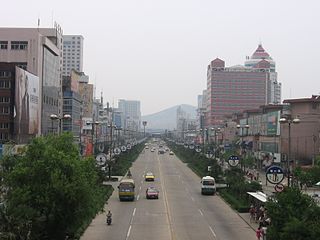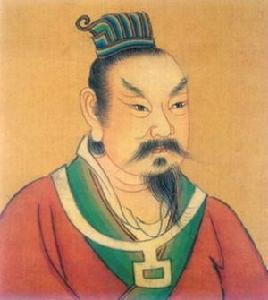It has been requested that the title of this article be changed to Yang Wu. Please see the relevant discussion on the discussion page. Do not move the page until the discussion has reached consensus for the change and is closed. |
| Wu | ||||||||||
| 吳 | ||||||||||
| ||||||||||
 | ||||||||||
| Capital | Guangling | |||||||||
| Languages | Middle Chinese | |||||||||
| Government | Monarchy | |||||||||
| Prince/King/Emperor | ||||||||||
| • | 907–908 | Yang Wo | ||||||||
| • | 908–921 | Yang Longyan | ||||||||
| • | 921–937 | Yang Pu | ||||||||
| Historical era | Five Dynasties and Ten Kingdoms Period | |||||||||
| • | Foundation of the State of Wu under Tang rule | 902 | ||||||||
| • | Fall of the Tang Dynasty | June 1, 907 | ||||||||
| • | Yang Longyan proclaimed himself King and inaugurated a new era name | 919 | ||||||||
| • | Yang Pu acceded the throne as Emperor | November 29, 927 | ||||||||
| • | Ended by the Southern Tang | 937 | ||||||||
| Currency | ||||||||||
| ||||||||||
Wu ( 吳 ), also referred to as Huainan (淮南), Hongnong (弘農), Southern Wu (南吳), or Yang Wu (楊吳), was one of the Ten Kingdoms in eastern China which was in existence from 907 to 937. Its capital was Jiangdu Municipality (江都) (modern Yangzhou in Jiangsu Province).

Huainan is a prefecture-level city with 2,334,000 inhabitants in central Anhui, China. It is named for the Han-era Principality of Huainan. It borders the provincial capital of Hefei to the south, Lu'an to the southwest, Fuyang to the west, Bozhou to the northwest, Bengbu to the northeast and Chuzhou to the east. Huainan is one of the core cities of Hefei Metropolitan Circle and is known for its coal industry and thermal power plants. Its built-up area is home to 1,938,212 inhabitants in 2010. Its city flower is the Chinese rose and its city tree is the Old-World Plane Tree. It is also considered to be the hometown and birthplace of tofu.

The Ten Kingdoms was a period in the history of Southern China that followed the fall of the Tang dynasty in 907. It lasted until the rise of the Song dynasty, which was founded in 960. Nine of the kingdoms were in the South and one small kingdom was in the far North. Many states were de facto independent long before the Tang Empire dissolved. The last of the Ten Kingdoms, the Northern Han, survived until 979.

Yangzhou, postal romanization Yangchow, is a prefecture-level city in central Jiangsu Province, China. Sitting on the north bank of the Yangtze, it borders the provincial capital Nanjing to the southwest, Huai'an to the north, Yancheng to the northeast, Taizhou to the east, and Zhenjiang across the river to the south. Its population was 4,414,681 at the 2010 census and its urban area is home to 2,146,980 inhabitants, including three urban districts, currently in the agglomeration.
Contents
- Founding
- Independence
- Subversion of power by Xu Wen
- Territorial Extent
- End of the Kingdom
- Rulers
- Wu and Southern Tang rulers family tree
- See also
- References
- Notes
- Sources
- External links
Some historians consider Wu to have begun in 902, when Yang Xingmi was named Prince of Wu by the Tang dynasty. All three rulers of Wu after 907 (when the Tang dynasty collapsed) were Yang Xingmi's sons. The first ruler Yang Wo was murdered by Xu Wen and Zhang Hao, and his two brothers after him were effective puppets dominated by Xu Wen and Xu Wen's adopted son Xu Zhigao (Li Bian), who usurped power in 937 to establish Southern Tang. Yang Pu, the last ruler, was the only one to claim the title of emperor; the other rulers were kings or princes.
Yang Xingmi, né Yang Xingmin, courtesy name Huayuan (化源), formally Prince Wuzhong of Wu, later posthumously honored King Xiaowu of Wu then Emperor Wu of Wu (吳武帝) with the temple name of Taizu (太祖), was a military governor (Jiedushi) of Huainan Circuit late in the Chinese Tang Dynasty, whose takeover of Huainan and several nearby circuits allowed him and his family to rule over territory that would eventually become the Five Dynasties and Ten Kingdoms state Wu, including most of modern Jiangsu and Anhui and parts of modern Jiangxi and Hubei.

The Tang dynasty or the Tang Empire was an imperial dynasty of China, preceded by the Sui dynasty and followed by the Five Dynasties and Ten Kingdoms period. Historians generally regard the Tang as a high point in Chinese civilization, and a golden age of cosmopolitan culture. Tang territory, acquired through the military campaigns of its early rulers, rivaled that of the Han dynasty. The Tang capital at Chang'an was the most populous city in the world in its day.
Yang Wo (楊渥), courtesy name Chengtian (承天), formally Prince Wei of Hongnong (弘農威王), later further posthumously honored King Jing of Wu (吳景王) and then as Emperor Jing of Wu (吳景帝) with the temple name Liezu (烈祖), was the first independent ruler of the Chinese Five Dynasties and Ten Kingdoms period state Wu.




